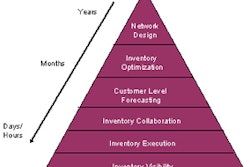San Mateo, CA — December 28, 2006 — What will 2007 hold in store for corporate finance and compliance efforts? Aceva Technologies, a provider of enterprise cash flow performance management software, is offering up its predictions for the New Year.
"Significant investments in [enterprise resource planning (ERP)] deployments and Sarbanes-Oxley compliance initiatives over the past years have driven the explosion in quantity and depth of enterprise data available for corporate finance," said Sanjay Srivastava, chief operating officer at Aceva. "Simultaneously, the cost of leveraging this data is exponentially shrinking, driven by the quantum leaps in data storage and management technologies along with the maturation of various software technologies for optimization. This convergence presents, for the first time for finance managers, a unique platform for optimizing business returns in key, untapped areas."
Based on its experiences working with customers, partners and industry experts, Aceva sees the following specific trends emerging:
"Significant investments in [enterprise resource planning (ERP)] deployments and Sarbanes-Oxley compliance initiatives over the past years have driven the explosion in quantity and depth of enterprise data available for corporate finance," said Sanjay Srivastava, chief operating officer at Aceva. "Simultaneously, the cost of leveraging this data is exponentially shrinking, driven by the quantum leaps in data storage and management technologies along with the maturation of various software technologies for optimization. This convergence presents, for the first time for finance managers, a unique platform for optimizing business returns in key, untapped areas."
Based on its experiences working with customers, partners and industry experts, Aceva sees the following specific trends emerging:
- Even as the strictest provisions around Section 404 loosen up, companies will continue to push large Sarbanes-Oxley (SOX) initiatives, now driven by tangible business benefits as opposed to regulatory compliance requirements alone.
Industry experts agree that transparency and process improvements afforded by SOX mandates have been good for businesses. New benchmarks for business standards in compliance and transparency evolve and as they become established and prevalent, they set new baselines for entire industries.
Equally, initiatives that were initially centered solely around compliance in areas such as real-time monitoring of control points or reconciliation of trade documents are now starting to pay dividends in the form of lower ongoing costs. Finally, the impact on the reduction of cost of capital is becoming clearer as creditors are starting to benefit from new SOX-related information that can help them assess the risk and price of allocating capital. - The Fortune 1000 will accelerate adoption of low-cost and high-return, add-on technologies that further their ERP investments. Having spent a good part of the last decade implementing and customizing ERP systems at great cost and pains, Fortune 1000 organizations are now seeking incremental returns while preserving their large investments in ERP software and services.
Key technologies, like advanced analytics, customized reporting or real-time reconciliation, are forging new frontiers in corporate finance since they are implemented using focused, contained projects that leverage the vast base of enterprise-wide data now available. As a result, companies are seizing extraordinary returns by implementing these add-on solutions that complement existing ERP infrastructure, but don't mimic the costs or implementation pains associated with typical ERP deployments. - The need for in-depth, enterprise data is exponentially increasing, while the cost to deliver and manage this data is rapidly shrinking. Beyond ERP, other initiatives — like the appeal of straight-through processing or the broad adoption of self-service applications to drive down the cost of servicing customers — are all driving the expansive need for greater size and depth of enterprise data.
Simultaneously, the cost of handling and storing data is coming down rapidly, spurred by meaningful advances in data storage technology and the coming of age of niche applications that can provide advanced information analysis such as predictive analytics or what-if reporting for finance managers. As a result, corporations are now able to invest in precision tools to perform sophisticated analytics or event-based management techniques to unlock significant value across their business processes.












